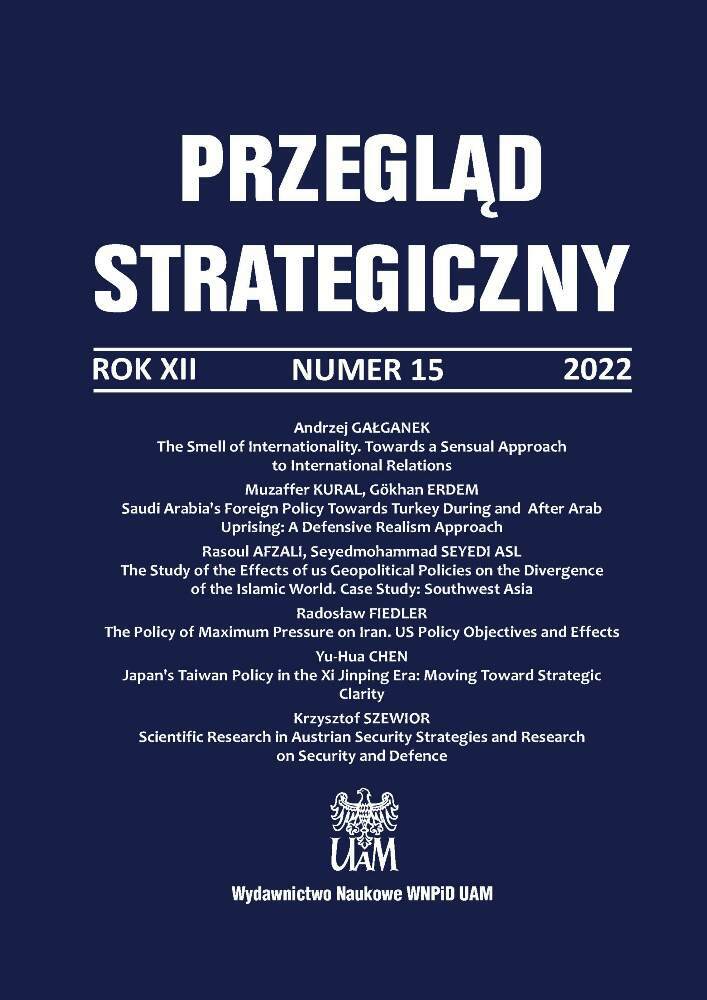Abstrakt
W ciągu ostatnich trzech dekad kraje Bliskiego Wschodu często były świadkami powszechnych protestów przeciwko reżimom autorytarnym. Pytanie brzmi, dlaczego te protesty nigdy nie przynoszą pożądanego rezultatu? Niezależnie od roli, jaką odgrywają podmioty zagraniczne w utrwalaniu autorytarnych reżimów na Bliskim Wschodzie, wydaje się, że tym, co powoduje, że protesty nie są wszechobecne, a infrastruktury polityczne nie upadają, jest fakt, że protesty nie zostały poparte przez większość narodu. W niniejszym artykule dowodzimy, że taki brak poparcia związany jest z fundamentalną przyczyną, którą nazwaliśmy cyklem strachu. Cykl ten obejmuje strach mas przed reżimem, strach przed porażką ruchu i jej strasznymi konsekwencjami oraz strach przed systemem politycznym, który ma dojść do władzy po obaleniu urzędującego rządu. Ważną rolę w tworzeniu i utrwalaniu tego strachu oraz przekształcaniu go w panikę pełnią rządy.
Bibliografia
Abrahamian E. (1982), Iran between Two Revolutions, Princeton University Press, Princeton. https://doi.org/10.1515/9781400844098 DOI: https://doi.org/10.1515/9781400844098
Aftergood S. (1997), Iraqi Intelligence Service – IIS [Mukhabarat] Department of General Intelligence, Federation of American Scientists, https://fas.org/irp/world/iraq/mukhabarat/intro.html (13 August 2021).
Ahmed Nafeez Mosaddeq (2011), The Arab world’s triple crisis, “European Voice”, August 8, http://www.europeanvoice.com/article/2011/february/the-arab-world-s-triple-crisis/70270.aspx (A13 August 2021).
Almond G. A. (1973), Crisis, Choice, and Change: Historical Studies of Political Development, Little Brown & Company, New York.
Beck M., Hüser S. (2102), Political Change in the Middle East: An Attempt to Analyze the Middle East, GIGA Working Paper, Vol. 203.
Benli Altunışık M. (2014), Rentier State Theory and the Arab Uprisings: An Appraisal, “Uluslararası İlişkiler”, Vol. 11, No. 42.
Brescia R. (2020), The Future of Change: How Technology Shapes Social Revolutions, Cornell University Press, New York. https://doi.org/10.7591/9781501748134 DOI: https://doi.org/10.7591/9781501748134
Brinton C. (1956), The Anatomy of Revolution, Vintage, London–New York.
Chossudovsky M. (2014), The Engineered Destruction and Political Fragmentation of Iraq, “Global Research”, 14 June, https://www.globalresearch.ca/the-destruction-and-political-fragmentation-of-iraq-towards-the-creation-of-a-us-sponsored-islamist-caliphate/5386998 (13 August 2021).
Cohan Al. S. (1976), Theories of Revolution: An Introduction, Thomas Nelson & Sons Ltd., New York.
Conn B., Mahmoud Madbouly M. (2020), VAT and Customs Duty Increases in Saudi Arabia – Implications for Investment into the Kingdom, “The National Law Review”, Vol. X, No. 176.
Cordesman A. (2003), Saddam’s Last Circle: The Core Forces Likely to Protect Saddam in the “Battle of Baghdad”, Center for Strategic and International Studies, 18 March, https://csis-prod.s3.amazonaws.com/s3fs.public/legacy_files/files/media/csis/pubs/iraq_lastcircle.pdf (13 April 2021).
Dodge T. (2003), Inventing Iraq: The Failure of Nation-Building and a History Denied, Columbia University Press, New York.
Edwards L. (1970), Natural History of Revolution (Heritage of Society), University of Chicago Press, Chicago.
Elbadawi I., Makdisi S. (2011), Democracy in the Arab World: Explaining the Deficit, Routledge, New York. https://doi.org/10.4324/9780203852866 DOI: https://doi.org/10.4324/9780203852866
Faroughy A. (1974), Regression in Iran, “The Observer”, 26 May.
Goldstone J. A. (2011), Understanding the Revolution of 2011, “Foreign Affairs”, May/June, http://www.foreignaffair.com/articles/67694/Jack-a-goldstone/understanding-the-revolution-2011 (13 August 2021).
Gottlied R. S. (1989), An Anthology of Western Marxism: From Lukas and Gramsci to Socialist-Feminism, Oxford University Press, New York.
Gurr T. R. (1968), Psychological Factors in Civil Violence, “World Politics”, Vol. 2, No. 2. https://doi.org/10.2307/2009798 DOI: https://doi.org/10.2307/2009798
Gurr T. R. (2011), Why Men Rebel, Paradigm Publishers, London–New York.
Hagopian M. N. (1974), The Phenomenon of Revolution, Harpercollins College Div, New York.
Hiro D. (2001), Neighbors, Not Friends, Iraq and Iran after the Gulf Wars, Routledge, London–New York.
Huntington S. P. (1958), Political Order in Changing Societies, New Haven, London–New York.
Machiavelli N. (2005), The Prince, translated by W. K. Marriott, Digireads.com.
Marfleet P. (2013), Never One Hand: Egypt: 2011, in: M. Gonzalez, H. Barekat, Arms and the People, Palgrave, New York.
Marx K. (1969), The Class Struggles in France, 1848 to 1850, in: Selected Works, Vol. 1, Progress Publishers, Moscow.
Milani M. M. (1994), The Making of Iran’s Islamic Revolution: From Monarchy to Islamic Republic, Westview Press, New York.
Moore B. (1993), Social Origins of Dictatorship and Democracy: Lord and Peasant in the Making of the Modern World, Beacon Press, Boston.
Neumann N. E. (1991), The Theory of Public Opinion: The Concept of the Spiral of Silence, “Annals of the International Communication Association”, Vol. 14, No. 1. https://doi.org/10.1080/23808985.1991.11678790 DOI: https://doi.org/10.1080/23808985.1991.11678790
Pahlavi Mohammad Reza Shah (1980), Answer to History, Stein & Day Pub, New York.
Radwan Z. (2013), Power and Policy, in: Syria: Intelligence Service, Foreign Relations and Democracy in the Modern Middle East, I.B Tauris & Co. Ltd., London–New York.
Rejali D. (2007), Torture and Democracy, Princeton University Press, Princeton.
Robin C. (2004), Fear: The History of a Political Idea, Oxford University Press, Oxford.
Sissons M., Al-Saiedi A. (2013), A Bitter Legacy: Lessons of De-Baathification in Iraq, International Center for Transitional Justice, March 2013, https://www.ictj.org/sites/default/.../ICTJ-Report-Iraq-De-Baathification-2013-ENG.pd (13 August 2021).
Skocpol T. (2016), States and Social Revolutions a Comparative Analysis of France, Russia and China, Cambridge University Press, Cambridge. https://doi.org/10.1017/CBO9781316423998 DOI: https://doi.org/10.1017/CBO9781316423998
Smelser N. J. (2011), Theory of Collective Behavior, Quid Pro, LLC, Louisiana.
Svendsen L. (2008), A Philosophy of Fear, Reaktion Books Publisher, London.
Tilly C. (1978), From Mobilization to Revolution, Addison-Wesley, New York.
Ward S. R. (2014), Immortal, Updated Edition: A Military History of Iran and Its Armed Forces, Georgetown University Press, Georgetown.
Weber M. (1958), From Max Weber: Essays in Sociology, eds. by H. Gerth, H. H. Gerth, C. W. Mills, Oxford University Press, New York.
Wezeman P. D. et al. (2020), Trends in International Arms Transfer, 2019, SIPRI, March 2020, https://www.sipri.org/sites/default/files/2020-03/fs_2003_at_2019_0.pdf (13 August 2021).
Licencja
Prawa autorskie (c) 2022 Ali Bagheri Dolatabadi, Mohsen Shafie Seifabadi

Utwór dostępny jest na licencji Creative Commons Uznanie autorstwa 4.0 Międzynarodowe.

